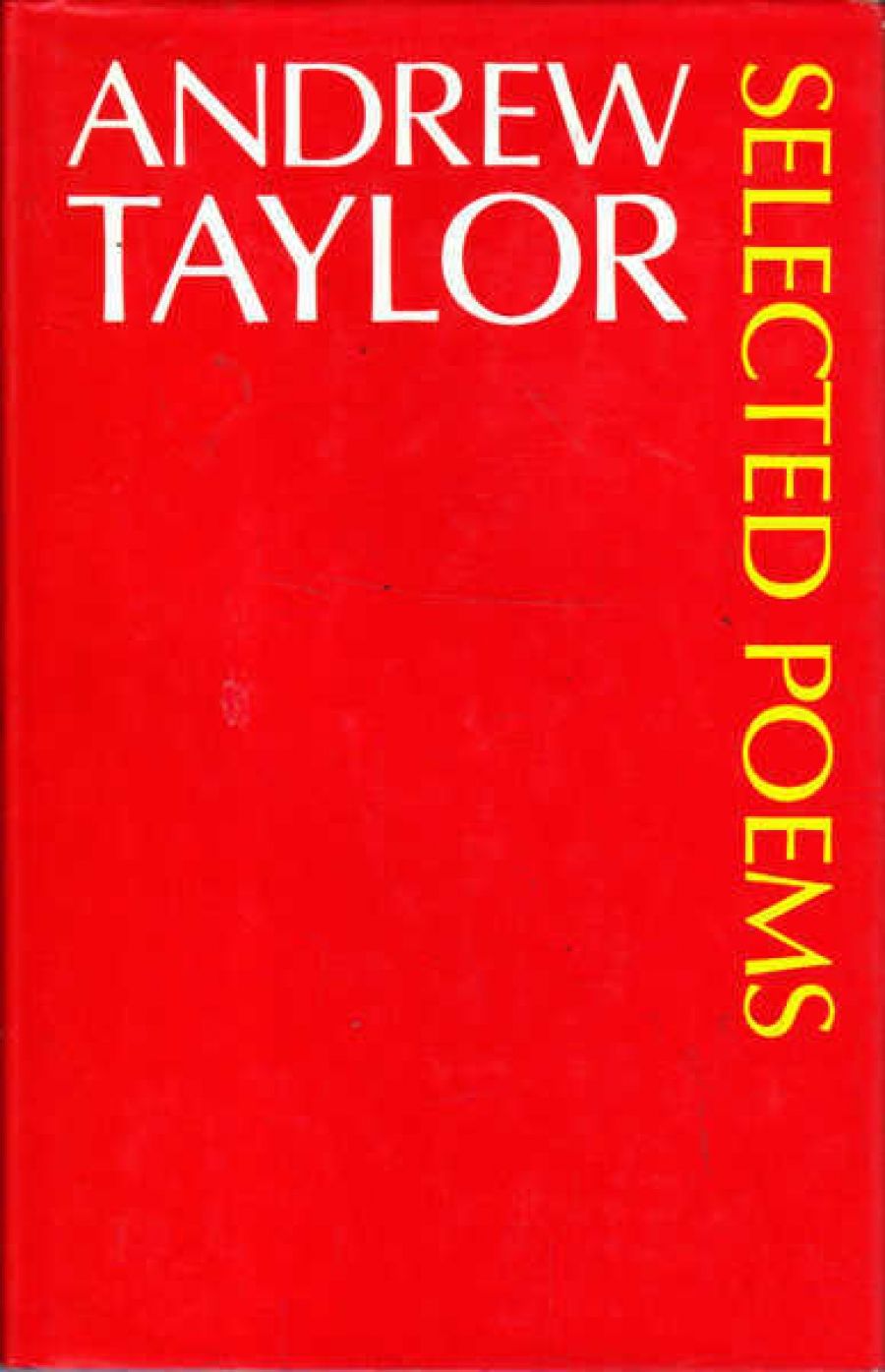
- Free Article: No
- Contents Category: Poetry
- Review Article: Yes
- Online Only: No
- Custom Highlight Text:
Andrew Taylor’s Selected Poems opens with rain and a quote from Rilke’s first elegy, collects new poems from 1975–80, touches his The Cool Change (1960–70), Ice Fishing (1970–72), and The Invention of Fire (1973–75), and ends with an epilogue the final image of which is a night watchman whittling a wooden deify which ‘Glows like a storm lantern / burning all night’. It’s night and the poet has gone to bed and closed the shutters, and the nightwatchman of the subconscious gets to work.
- Book 1 Title: Selected Poems, 1960–1980
- Book 1 Biblio: UQP, 198 pp, $12.95, $5.95 pb.
We all know that many Australian writers have evolved an ontology of despair, a failing of the romantic spirit in face of a reified and materialist world, where process (and life) runs into a dead heart or comes from ranges we can never penetrate. ‘Ah Well’ says Lawson; ‘Such Is Life’ says Furphy. That angel is truly terrible: but Andrew Taylor, like Rilke, doesn’t hear that particular voice from the storm. His poems develop a story of the pain of living: a complex geometry of love which doesn’t have equilateral triangles, the death of a loved parent, separation from children, but they are woven into a rich fabric of observation of life: the weather, the challenging difference between humankind and the animals, and nature methodised in gardens (there are no awesome landscapes bereft of human figures in his poetry-he is the poet of the city backyard and the farmhouse). Painful, but positive and optimistic.
What is the prevailing tone of the poems? Calm and clear, I would suggest. Calm even when the voice is processing an intense moment as in the prose poem ‘If you take it away I’ll scream’, which ends with an evaluation of the feeling in considered periods:
Only the hollow shape of my scream, the cavernous mount which is the obverse of that solid world we talked about. So much, so hard. It would be the hollow at the centre of my sleep, but now I would be at the centre. Surrounded by that scream.
And so clear in its images: visual units of a beautifully balanced composition which are brought together by the frame of metaphor in the poem’s title and the satisfying logic of the last four lines of ‘End of Vacation’.
There’s a special emptiness
After the holidayers leave and before
The brave kicking horses of the carousel
Are packed like lithe little carcasses
In the contractor’s truck
And driven away
Something in the wind
Warns the willowy horses and their
flying tails
Summer is over
Though the sun’s hot still
And wind stings
With a spray of hot sand
It’s as though every shell on the beach
For a moment stooped inward
Absorbed in its hollowness
A man with a spanner is walking
through the dunes
While out past the breakers
Black figures
Ride on the sunset
That calm and clarity are at their best in the newer poems. ‘The Fountain’ uses a formal landscape in the way in which Donne (in ‘Twicknam Garden’) or Marvell (in ‘Nunappleton House’) did as a way of showing the interaction of the inner life with the outer world-but of course that outer world is an example of an order which the soul finds within us through love. The metaphysical play between greater and lesser worlds, between the ‘Ocean of the Mind’ and the dry reality around us, in the twentieth century has become the testing of romantic love through the power politics of sex:
Within us we find a woman and a man
Listening to the fountain
As they finish off the baked carp
They prepared for lunch
They’re frightened of each other
As they bare one after another the
barbed bones
They wouldn’t dare feed the cat
Around them the slow drench of
Autumn sunshine
Collects in pools on the paved brick
And drains into cool shadows
Of melaleuca tamarisk and flowering
apple
As we turn from that silent couple
My hand on your breast
And yours already on mine
There are twenty years of poems in this collection and they show very well the change from formal stanzas and well-done literary wit.
PROLOGUE
My new arm measures its season
By the white watch mark at the wrist
Already, without reason,
The weather like an alchemist
Turns into gold the matter of my
arm,
Tracing the shape of time across the
Bone
To the more fluent wit of the free forms of the mind at play:
A MEMBER OF THE CRYSTAL SET
If the cat wants to go out
Worlds we cannot deny
Wait on its whiskers
And if my fingers prod the twittery
dark spaces
Of the radio
Something that’s still not speech
Needs guiding in
I’ll try to bring it in
I’ve been caught too
By crosscurrents and undertow
And know what it means
Being brought in
Clear
By a cat’s whisker
Searching the glittering black cliffs
For a sensitive spot to come aground
It’s not poetry that will grab you by the lapels and bellow in your ear, or slobber drunkenly for two-bob and stand-over sympathy, but poetry written out of calm voice and a clear head. It is gentle and persuasive, subtle and thoughtful, and content in its own vision. Finding the angel is not that important, weeding the calendulas will do, and it is sufficient
That we wisper with fear
Love sure at last
Least of ourselves


Comments powered by CComment